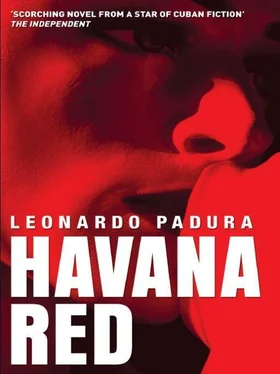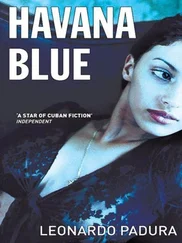Leonardo Padura - Havana Red
Здесь есть возможность читать онлайн «Leonardo Padura - Havana Red» весь текст электронной книги совершенно бесплатно (целиком полную версию без сокращений). В некоторых случаях можно слушать аудио, скачать через торрент в формате fb2 и присутствует краткое содержание. Жанр: Полицейский детектив, на английском языке. Описание произведения, (предисловие) а так же отзывы посетителей доступны на портале библиотеки ЛибКат.
- Название:Havana Red
- Автор:
- Жанр:
- Год:неизвестен
- ISBN:нет данных
- Рейтинг книги:3 / 5. Голосов: 1
-
Избранное:Добавить в избранное
- Отзывы:
-
Ваша оценка:
- 60
- 1
- 2
- 3
- 4
- 5
Havana Red: краткое содержание, описание и аннотация
Предлагаем к чтению аннотацию, описание, краткое содержание или предисловие (зависит от того, что написал сам автор книги «Havana Red»). Если вы не нашли необходимую информацию о книге — напишите в комментариях, мы постараемся отыскать её.
Havana Red — читать онлайн бесплатно полную книгу (весь текст) целиком
Ниже представлен текст книги, разбитый по страницам. Система сохранения места последней прочитанной страницы, позволяет с удобством читать онлайн бесплатно книгу «Havana Red», без необходимости каждый раз заново искать на чём Вы остановились. Поставьте закладку, и сможете в любой момент перейти на страницу, на которой закончили чтение.
Интервал:
Закладка:
Quite the contrary, thought the Count, already set on forgetting biblical transfigurations too remote from sordid, earthly transvesting, as he took another look at Faustino Arayan’s house and compared it to the dark, damp cavern inhabited by Alberto Marques, whence the transvestite Alexis had emerged on his last night-time excursion. An unbridgeable, impossible abyss existed between those two vital spaces, of established strata, self-interest, merits forgotten and recognized, favours lost and opportunities grasped or not, which distinguished them and set them apart, like light and shadow, poverty and opulence, sorrow and happiness. Nevertheless, in life and death, Alexis Arayan had fused the extremes of his origins and destiny, and created an unlikely link.
From the moment his car turned into Seventh Avenue in Miramar, under the still benevolent sun of that August morning, the Count felt he was entering another world, its face more pleasant and better washed than that of the other city – the same city – they’d just crossed. And now, in front of Faustino Arayan’s house, he brought his idea full circle: quite the contrary, when he thought how the original owners of that preening mansion with its windowpanes still intact had no doubt also tried to delineate a drastic difference between two worlds, the best of which – naturally for them – they had intended to magnify by building that house: oh, those good old bourgeois pretensions to permanence… At this moment, perhaps in Miami, Union City or wherever the hell they were, thirty years on, they must still miss the precise beauty of that construction where they’d invested fistfuls of dreams and money, thinking it was eternal. But people usually get it wrong, the Count told himself, penetrating the maze of his mind as it raced on and thinking that, if he’d lived in a house like that, he’d like to have owned at least three dogs running around the garden. And who’d pick up the shit? he wondered, lifting a foot in his imagination to avoid doggy deposits, and decided to do without his pack of hounds and devote his time – and this was beyond debate – to cherishing the library he’d have on the second floor, overlooking the garden.
On his journey the Count had also gleaned from the lips of Sergeant Palacios two choice items of disturbing news: Salvador K.’s blood, like the murderer’s, was AB, and nobody in the vicinity of the studio on Twenty-First and Eighteenth had seen him on the night of the crime, although they’d seen him go in more than once with Alexis Arayan. According to the Count’s calculations, those two tickets meant he was sure to win the raffle he’d bought into.
Manuel Palacios rang the bell and the maid opened the door.
“Come in,” she said, without saying good-day, and pointed them to the armchairs in the sitting room. “I’ll tell Faustino right away.” And she disappeared on ghostly tiptoe.
The Count and Manolo looked at each other, laughed and prepared to wait. Ten minutes later, Faustino Arayan appeared.
He was wearing a guayabera that was so white and elegant the Count wouldn’t have dared to wear it for a minute: it was resplendent rather than white, with tenuous tucks, a shiny thread and the maker’s name discreetly but visibly embroidered on the top right-hand pocket. The grey pin-stripe trousers displayed the precise crease of an expert iron, while his dark patent leather moccasins seemed light and comfortable.
“Good-day,” he said, holding out a hand; a strong, solid, pink hand, like its owner, whose only sign of being in his sixties was an almost totally bald pate which distinguished the equally shiny roundness, noted the Count, of his enormous head.
“I’m really sorry to trouble you today, companero Arayan. We know you had a bad day yesterday, but…”
“Not to worry, not to worry…”
“Lieutenant Mario Conde,” he introduced himself, and pointing to his colleague, he said, “and Sergeant Manuel Palacios.”
“I told you, Lieutenant, not to worry. You’re doing your job, and I have to do mine today, because life goes on…”
“Thanks,” said the Count and observed the ashtray from Granada, as clean as ever, as if it had never been used.
“Just a moment, I’ll get us a drop of coffee, if you’d like one?” asked Faustino Arayan, and without waiting for a reply, he whispered: “Maria Antonia.”
The black woman appeared like a flash, with a tray of three cups of coffee, as if she’d been waiting for the gun from behind a starting line. The damn bitch floats, the Count was convinced, and he was the first to be served. When she’d passed the cups around, she left the tray on the table and flitted back into the inner recesses of the house.
“May I smoke?”
“Yes, of course. Would you like a cigar? I have some excellent Montecristos.”
The Count thought about it: no, he shouldn’t, but he dared. “What the hell,” he told himself.
“I’d be glad to accept one, to smoke later.”
“Yes, of course,” answered his host, and from the lower drawer of the table in the centre of the room he offered the Count a cedar-wood box where a dozen Montecristos lay in perfect formation, finely scented and pale-hued.
“Thanks,” the Count reiterated, and put the cigar in his shirt pocket.
“Well, Lieutenant, what can I do for you?”
Only then did the Count become aware that he had nothing to say or had forgotten what he’d intended to say: he’d been dazzled by so much glitter and couldn’t clearly see the route he should follow. He had returned simply to comply with police routines in that perfectly ordered house, with its gleaming guayaberas and bald pates, black maids with wings on their ankles and ashtrays from Granada without a speck of dust, which seemed quite unrelated to the eschatological story of a queer who’d been strangled with two coins up his backside, after exhibiting himself through the city streets in a theatrical garment which would end up stained by major and minor effluvia – as Alberto Marques might have said.
“How’s your wife?” he asked, looking for a way to broach the matter.
Faustino nodded repeatedly.
“In very bad shape. Yesterday, when we got back from the funeral, Dr Perez Flores, well, I’ll tell you his name because everybody knows who Jorge is, prescribed sedatives and tension-reducers. She’s asleep now. The poor woman can’t accept it. But I knew one day that boy would give us a big upset, and now look what’s happened.” He paused, and the Count decided not to interrupt. “Who knows what business he’d been mixed up in? From adolescence Alexis has been a constant headache. Not only because of his… problem, but because of his character. Sometimes, I’ve even thought he hated both me and his mother, and he was particularly despotic with her. He always blamed us for the fact that we spent so much time outside Cuba and that he had to stay here with Maria Antonia and my mother-in-law. He refused to understand that my work forced me down that path. He couldn’t come with us, where would he have studied? Six months in London, three in Brussels, a year in New York, then back to Cuba… Can you imagine? I’d have preferred to give him a more stable life, for us to have brought him up here, and I can tell you I’d have kept him like that, under my thumb, but my work has always assigned me very important duties and my wife and I always made sure he had all he needed: the house, his grandmother, and Maria Antonia, who loved him as if she were his real mother, school, the home comforts he wanted… everything. If this seems like a punishment… I’ll confess something, so you see where I’m coming from: my son and I never got on. I think I was really to blame, I never made concessions to him, though to begin with I did speak to him and try to help. Now I think mine was the worst approach possible. And look what has happened, how it’s all turned out. I feel guilty, I don’t deny that, but he also behaved very badly towards me and his mother, right from adolescence. And afterwards, when he befriended that scoundrel, the Alberto Marques guy, it was impossible to see eye to eye. That man brainwashed him, injected his head with poison, changed him for ever in every way: it isn’t that he started to write or waste paper trying to be a painter. No, it was worse than that. It was his moral, even political behaviour, and I couldn’t allow that, no way, now do you understand me? No one, not Alexis nor anybody, was going to defile the status I’d won from so many years of struggle, work and sacrifice, so I dictated my rules of the game very clearly: if he wanted to live under this roof and enjoy all the comforts that gradually one had been able to accrue, one couldn’t think certain ideas about this country, or be criticizing it all the time or eat shit in church or associate with an envy-ridden guy like Alberto Marques… It had to be all or nothing, and that’s what I told him one day, because he was no longer a child, and he got furious, I wish you could have seen him, and heard the things he said, that I was a dogmatist, an extremist and a troglodyte and a good few things besides… And that was when he said he was leaving home. I know he always came back to see his mother and Maria Antonia, after his grandmother died, and if I arrived, he left, and I was almost pleased, because I didn’t want any more arguments with him. These conflicts upset me a lot, you know?… I regret that now, perhaps I could have done more for Alexis, forced him to keep going to the doctor, been more strict with him, whatever, but he never gave me that option,” he said, and bent down to the cigar-box. He took one, but rejected it immediately, as if suddenly the possibility of lighting one of those beautiful Montecristos seemed inappropriate.
Читать дальшеИнтервал:
Закладка:
Похожие книги на «Havana Red»
Представляем Вашему вниманию похожие книги на «Havana Red» списком для выбора. Мы отобрали схожую по названию и смыслу литературу в надежде предоставить читателям больше вариантов отыскать новые, интересные, ещё непрочитанные произведения.
Обсуждение, отзывы о книге «Havana Red» и просто собственные мнения читателей. Оставьте ваши комментарии, напишите, что Вы думаете о произведении, его смысле или главных героях. Укажите что конкретно понравилось, а что нет, и почему Вы так считаете.











